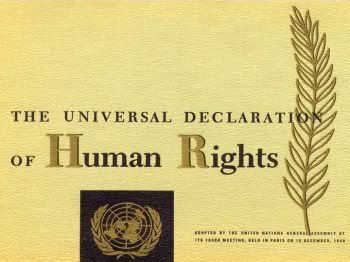Koh Jie Kai / Senior Writer
 As a Ms Dell Butler noted in the Straits Times forum a few months ago, there has been plenty of defensiveness with respect to our long-standing coolness towards human rights, with Minister Mentor Lee Kuan Yew claiming that human rights organisations are in a conspiracy to do us in.
As a Ms Dell Butler noted in the Straits Times forum a few months ago, there has been plenty of defensiveness with respect to our long-standing coolness towards human rights, with Minister Mentor Lee Kuan Yew claiming that human rights organisations are in a conspiracy to do us in.
There are of course Singaporeans who are uncomfortable with a public discourse emphasising “human rights”, such as a Ms Tricia Mok, who opined in the Youthink section of the Straits Times that demonstrations on her Australian university campus are public nuisances. Such Singaporeans believe that talk of human rights is “idealistic”, and that what we really should be concentrating on are material needs.
But far from being some high-minded irrelevance, many of the rights enshrined in the Universal Declaration of Human Rights (UDHR), are in fact in practice upheld in Singapore. For example, the same people who keep bleating about how we correctly emphasise material prosperity over human rights, would probably be the first to make plenty of noise if the government failed to fairly compensate them for their property if it had to be purchased (sadly not the case in much of rural China). They do not suffer the fate that many farmers do in China. This is mostly because the Singapore government does not violate Article 17(2) of the UDHR, which tells us that no one shall be arbitrarily deprived of his (or her) property.
.
And it isn’t just the protection of property we take care of. If you look at the US government’s opinion on our human rights situation, it really was not too bad in 2007. For a start, the government DID NOT commit human rights abuses like arbitrary or unlawful killings. It failed to hold any political prisoners. Torture and inhumane treatment are not approved methods of police interrogation, in practice are hardly ever used, and police officers who ill treat detainees can expect to be charged in court. Nowadays, unhappy citizens can even take to the parks to protest. And so on.
Furthermore, in truth the public does care about a minimum standard of human rights. Recall what happened a few years ago when 2SG Hu died as a result of that now notorious training session. The result was a public outcry. Some military personnel were charged with responsibility for the 2SG’s death. The government’s reaction to the incident was in fact a practical application of the principles of Article 3 UDHR ( the right to life), and Article 5 ( the right against torture).
To be fair, not everyone in the government is instinctively hostile to the suggestion that Singapore is not all that unique when it comes to practicing internationally recognised human rights norms- credit for example must go to Foreign Minister George Yeo, who pushed hard for some sort of ASEAN human rights charter. But many others insist that our practice of “asian values” ( whatever that means), also means that our human rights standards must also be Uniquely Singaporean.
As this discussion has sought to show, however, that Singapore upholds many human rights norms. There really is no dispute over many rights- no one is seriously suggesting for example, that torture is suitable for use as part of police questioning procedure, or that we should not allow people charged with a crime to be represented by a lawyer.
For the most part, much of the debate over human rights standards (or lack thereof) in the Singapore context takes place over issues such as the right to freedom of speech, or of association. And even then the debate is about the extent of those rights, not whether we should have them in the first place. In any event the debate over human rights standards is a debate which goes on in “Western” democracies as well – many states in the US practise the death penalty, whereas EU member states consider the practice a cruel and unusual punishment.
————–
